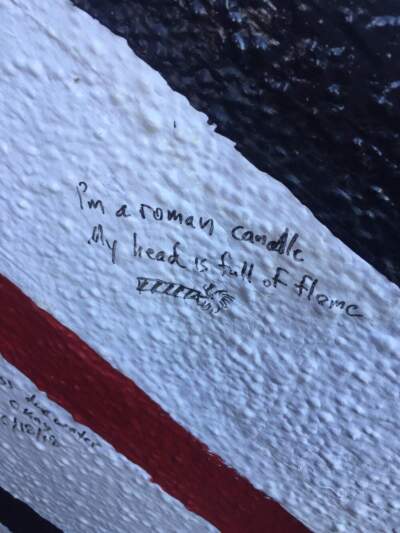Advertisement
Commentary
I still reach for Elliott Smith, 20 years after his death

My 2023 concert calendar has been packed with reunion tours — bands celebrating anniversaries of the albums I cherished while coming of age, artists whose lyrics were landing gear for my adolescent angst. But, in reveling in the music that made me, I’ve been reflecting on a different anniversary. Elliott Smith — my favorite artist — died 20 years ago.
In the two decades since his passing, there have been posthumous album releases and re-issues, articles, books, a documentary, a podcast and tribute covers — from artists like Beck to Madonna. Elliott’s music has inspired a new generation of artists, from Frank Ocean to Phoebe Bridgers, who avowed, “If someone doesn't like his music, I actually feel like I'm not going to agree with them about anything.”
I first heard Elliott Smith in college when his single, “Needle in the Hay” appeared on a playlist circulating around my dorm. It was 2008 — the age of the indie singer-songwriter — but from those first guitar strums, I knew he was special. I disappeared into his discography, looping his eponymous album between philosophy classes, and marveling that his “Either/Or” album — borrowed its name from philosopher, Søren Kierkegaard, whom I was studying at the time. I fell in all-consuming love with Elliott’s intimately vigorous voice and piercingly perceptive writing. Lines like, “I don’t know what to do with your clothes or your letters, it’ll make a whisper outta you,” stunned me with their concise complexity. Though I didn’t write them, his words felt taken from my own heart.
The reasons I first clung to Elliott’s music seemed obvious at the time — I was going through a messy breakup, battling disordered eating and growing apart from friends at other schools. But mapping my love of Elliott solely to these challenges is too simple a narrative. I understand now that this was a time of growing into myself, of fighting to shed old identities and patterns, while not exactly knowing how. Elliott spoke to me in mundane, micro moments — campus walks, grabbing coffee solo in the city. As I heard his songs over and over and over, his words and intricate melodies stoked insights in me about the world, and my place in it.
The well-trodden narrative about Elliott Smith is this: he was an icon of Portland’s late ‘90’s-post-grunge scene. After his music appeared in “Good Will Hunting,” he secured an Oscar nod for his song, “Miss Misery,” and performed it live at the Oscars in a now-infamous wrinkled white suit. As he skyrocketed to fame, his open struggles with mental health and drug addiction came into media focus alongside his music. And in 2003, Elliott died by apparent suicide at the age of 34.
It didn’t take long for taglines like “Mr. Misery” to form, media spins that Elliott was just another poetically melancholic soul, with song titles like, “Everything Means Nothing to Me.” It was even forecasted that his manner of death would become a large part of his legacy. If Elliott’s memory is reduced to a line in one of his songs, or an ending, we’re missing so much of the story.
I understand now that this was a time of growing into myself, of fighting to shed old identities and patterns, while not exactly knowing how.
Elliott, while he was still alive, often corrected this perception. He once said, in a profile in Spin, “I don’t feel any sadder than anybody else I know. I’m happy some of the time, and some of the time I’m not.” Those that knew him did so too. “He's been turned into somewhat of an icon, but he was actually a total goofball most of the time,” said Dorien Garry, Elliott’s friend and former publicist.
Elliott was an observer, and a storyteller. “The biggest mistake people make is assuming his songs are all confessional. It’s his own life, but it’s a lot of allegory. You see recurring characters in his songs,” said Larry Crane, archivist for Elliott’s estate. This is evidenced in the very first song I discovered of his. Again, from Dorien Garry: “I mean, ‘Needle in the Hay’ is obviously about drugs and despair. But when I got to know him better, I learned that song was more about what was going on in the Pacific Northwest in the small music community in the early ‘90s and how badly drugs were infiltrating it.” Elliott Smith was a critic of his surroundings and channeled that into art, as in “Between the Bars,” a song that speaks about a night out and love, layered with entrapment and dependence.
Advertisement

Words are powerful. A well-crafted phrase can get us thinking abstractly — about ourselves, about the world. Elliott understood this. “People seem so chaotic internally, but being filtered through some form, like making a record sort of filters it down into something that can be understood,” he once said.
Luke Wood, Elliott’s contact at DreamWorks Records, reflected, “It was such a joy watching the thought he would put into small things as he wrote: Should it be to or should it be at? Should it be first-person or second-person? Should this be plural or singular? Where should I put the modifier? He would write five different versions of a sentence, only changing the modifier.” Stories, so often, are how we make sense of an experience of being human that we can’t ultimately control. His death was tragic, but his life was more. And his music is still a world within a world to discover.
While my listening sessions of 2008’s singer-songwriters have largely gone the way of my iPod Shuffle, Elliott’s music is perennial for me. His storytelling kept pace with the stride of my life. From “Coast to Coast” becoming a staple of my running playlist, to lines of “Everybody Cares, Everybody Understands” — so here I lay dreaming, looking at the brilliant sun / raining its guiding light upon everyone — inviting me to notice a single tree’s leaves floating in the wind.
I reach for Elliott to connect more deeply with the world around me, when I’m searching for that same inner spark to make sense of a human experience that resists easy explanation. While his story is complex, as was his life — as is every life — maybe it’s enough to acknowledge that, and keep living.

